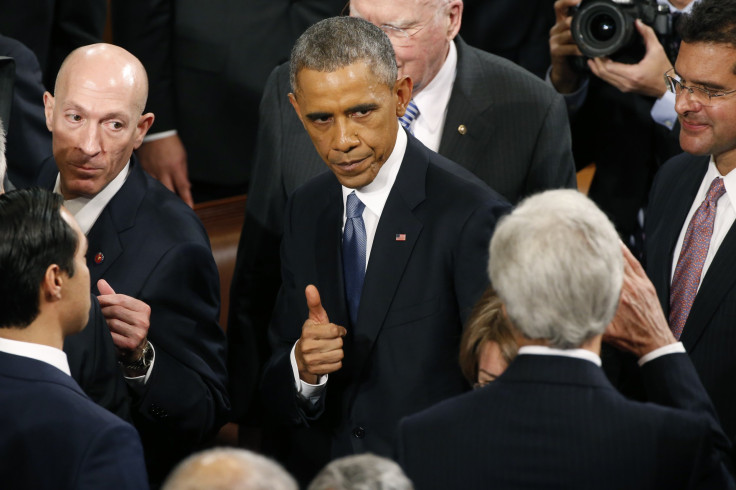Obama State of the Union Civil Rights: Voting Rights Act Mention, Selma Visit Praised By Black Leaders

President Barack Obama was praised for highlighting the nation's ongoing civil rights and police brutality debate during Tuesday night’s State of the Union speech by black leaders who have been vocal in the wake of protests against the killing of unarmed black men. A few hours before he delivered the speech to Congress, a top Obama advisor announced the president would travel to Selma, Alabama on March 7 to commemorate the 50th anniversary of the Selma to Montgomery marches, as well as the 50th anniversary of the signing of the Voting Rights Act of 1965.
“POTUS will travel to Selma, AL on the 50th anniv of Bloody Sunday to commemorate the sacrifices of the marchers on whose shoulders he stands,” tweeted Valerie Jarrett, the senior advisor to Obama. The president’s mention of Selma and the voting rights came in the last third of the prepared State of the Union speech when, in one sweeping pronouncement, he related that historical moment with a call for reforms of the American criminal justice system.
“We may go at it in campaign season, but surely we can agree that the right to vote is sacred; that it’s being denied to too many; and that, on this 50th anniversary of the great march from Selma to Montgomery and the passage of the Voting Rights Act, we can come together, Democrats and Republicans, to make voting easier for every single American,” Obama said. Amelia Boynton Robinson, a 103-year-old civil rights activist from Tuskegee, Alabama who traveled to Washington to hear Obama deliver the speech, was also present when President Lyndon B. Johnson signed the Voting Rights Act into law at the White House in 1965, the Montgomery Advertiser reported.
The speech drew praise from the NAACP. “Given President Obama’s ringing endorsement of a right to vote as ‘sacred,’ we expect his continued push for strengthening voting rights,” Cornell William Brooks, the NAACP president and CEO, said in a statement after the speech. The president’s remarks also drew praise on Twitter, including from account for the National Urban League, organizers of the #BlackLivesMatter movement, and the Dream Defenders, who anticipated a strong statement on race relations.
“We may have different takes on the events of Ferguson and New York,” Obama said in the State of the Union speech. “But surely we can understand a father who fears his son can’t walk home without being harassed. Surely we can understand the wife who won’t rest until the police officer she married walks through the front door at the end of his shift. Surely we can agree it’s a good thing that for the first time in 40 years, the crime rate and the incarceration rate have come down together, and use that as a starting point for Democrats and Republicans, community leaders and law enforcement, to reform America’s criminal justice system so that it protects and serves us all.”
He again alluded to civil rights and criminal justice reforms toward the end of the State of the Union speech. “I want our actions to tell every child, in every neighborhood: your life matters, and we are as committed to improving your life chances as we are for our own kids,” Obama said.
There were mixed reviews to Obama’s race remarks:
TIME OUT: @BarackObama mentioning climate issues, queer issues, women & veterans DOES NOT take away from #BlackLivesMatter movement #SOBU
- The Dream Defenders (@Dreamdefenders) January 21, 2015For those of you who believe @BarackObama didn't say enough about race, that is our charge. #SOTU #BlackLivesMatter #WeGotNow
- Brandi Richard (@brandirichard) January 21, 2015© Copyright IBTimes 2024. All rights reserved.












